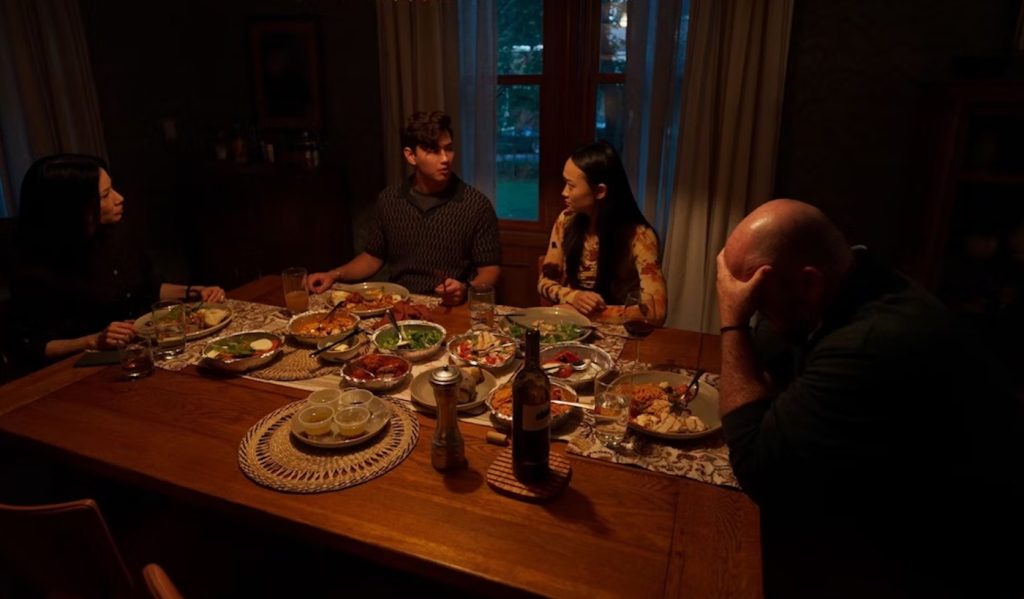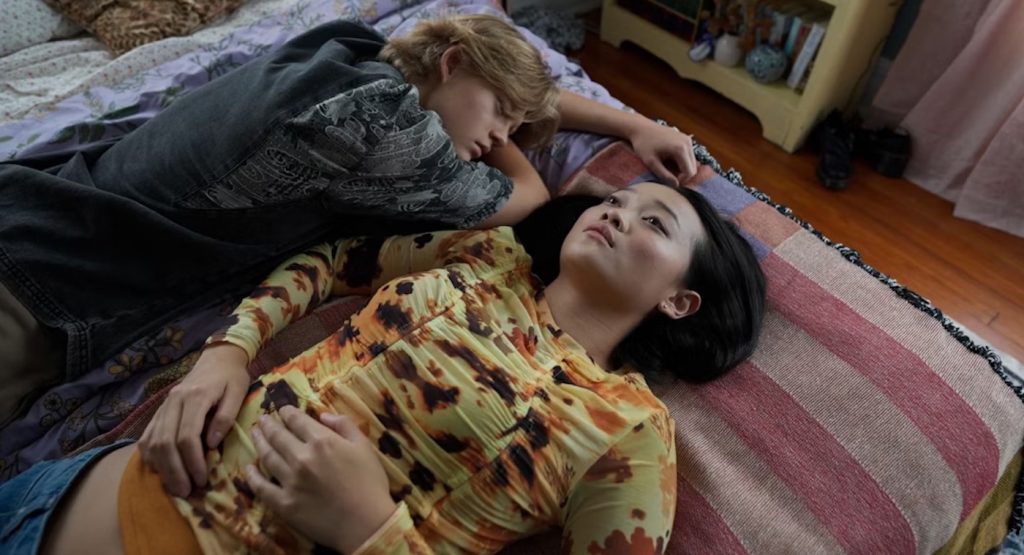“Presence” Screenwriter David Koepp on Writing a Ghost Story Told by the Ghost
One of the unwritten rules of screenwriting is you don’t put camera direction in the script. It’s about the worst possible move for a writer, a serious no-no in Hollywood, and the number one way to guarantee your work never gets produced. But in the case of Presence, a new, propulsively effective haunted-house movie with a twist, it was possible for the screenwriter David Koepp to put such objections aside and embrace the visual possibilities because the camera, in this story, also happens to be the title character. Both are referred to as “we” in the script.
“I’ve written POV shots, of course,” said Koepp, one of the busiest and most highly regarded screenwriters in Hollywood. “But I’ve never written a whole movie from one limited point of view. The presence itself, played by the camera, is in every single scene.”
The idea for Presence, in theaters now, came from Steven Soderbergh, whose mother was a parapsychologist; she even looked like Beatrice Straight in Poltergeist. Soderbergh self-financed the production and shot and directed it. It’s the second collaboration (following KIMI, a 2022 tech-thriller with Zoe Kravitz) for the longtime friends.
Presence involves a family that moves into a house inhabited by an unknown spirit. Weird, supernatural stuff ensues following a recent death, and the family unravels as secrets are kept and exposed. Lucy Liu is the steely mother, who seems to be moving funds around in ways that aren’t entirely legal, dotting on her high school-athlete son (Eddie Maday), and ignoring her sad and confused teenage daughter (Callina Liang), who’s suffered a recent trauma. The father (Chris Sullivan) makes an effort to be the responsible parent but is too weak and fearful. The entity doesn’t know why it’s there or who these people are, but we start to think something may have happened in the house. It’s a tightly constructed story that all takes place in one location (each scene is shot as an oner), and there’s an undercurrent of mounting dread.
When it debuted at the Sundance Festival, Presence received rave reviews and a few buzzy headlines after some people at the screening walked out, too frightened to stick around for the finale of the 85-minute movie. Neon, the hip indie distributor, swooped it up for $5 million.
A tightly-wound, smaller-scale movie that gives you the shivers is a nice change of pace for Koepp, whose credits are lined with titles that tend to fill popcorn buckets, not festival lineups. Pick a title: Carlito’s Way, the original Mission: Impossible and Spider-Man movies, and Steven Spielberg’s War of the Worlds. After breaking into the movies in 1989 with Apartment Zero, a Polanskian thriller set in Argentina that he co-wrote and produced, Koepp has continued to work at a breakneck pace. He once had eight of his screenplays made into films over a five-year period.
His next film, Black Bag (out March 14 and also directed by Soderbergh), is a spy story about a married couple, played by Cate Blanchett and Michael Fassbender. This summer will have Jurassic World Rebirth, Koepp’s first return to the franchise since writing the original Jurassic Park movie and its sequel, The Lost World: Jurassic Park, both directed by Spielberg. Koepp said, “Rebirth is a little more like the tone of the very first movie.” He’s also written a new U.F.O. movie for Spielberg that’s in pre-production.
Our conversation, which covered his fears as a parent, the movies that deserve more recognition from the Oscars, and why hope is one of his hallmarks, has been edited and condensed.
What kinds of reactions have you gotten to Presence?
They’ve been great. I’ve had a chance to see it with different audiences because it’s played at several festivals, and there’d be Q&As, so I’d end up watching the movie many times, and it plays one of my favorite ways. Unless you have a comedy where you really want to hear people, rapt attention is the best you can ask for, and that’s what it’s getting. But the calls and emails I’ve gotten from friends who’ve seen it, they’ve also been surprised. They find it quite emotional and moving, and that made me happy because it felt that way to me when I was writing it.
Much of the talk surrounding the movie has been about its POV format: the camera is the ghost. What’s the trick to writing for a character we can’t see?
Accepting that it is a character, and it’s got to be fleshed out in your mind. In the pages that [Soderbergh] sent me when he first had the idea for the movie, there would be these little moments where the presence retreats into a closet. And I said, okay, it’s shy, it’s jumpy. So then I had to keep in mind that the movie isn’t a four-character piece; this is a five-character piece, and the presence itself, played by the camera, is in every single scene. We do not see this character, but we experience the film as that character. And so, if you watch the film a second time, you see the presence getting emboldened as the movie goes on. From that opening shot, it’s very anxious and confused as it searches an empty house. Then a family comes in, and it’s drawn to them, the daughter in particular, and it gets braver. But then it gets frightened, and then it slowly learns it can maybe manipulate events a little bit.

You said writing this kind of movie meant writing about your own fears as a parent. So how much of you is in the dad?
I certainly related to him. I have [a family], and raising four kids is a pretty wild ride. Certainly, his fears about what’s out there are very real fears I share. So, I don’t know. Quite a bit, probably.
[Start Spoiler Alert!] The issue of control looms large in this story. One scene that stuck with me is when the daughter and a guy-friend (West Mulholland) go up to her bedroom. Although he’s reassuring her that she can decide how it all goes with them, we get the sense that this guy is someone to stay away from.
Well, he’s full of shit. Ryan is a manipulator and a user of the worst kind. Certainly, for a number of years, there’s been a great deal more sensitivity to the notion of consent, particularly sexually, and I think Ryan has picked up all that lingo, and he’s using it to further his own aims, which are not so pure.

When you and Soderbergh were developing Presence, how did you see this film taking shape? Were you very clear about the stuff you didn’t want in the movie?
So much was dictated by location and budget. We wanted it to be all in one house, partly for aesthetic reasons and partly for budgetary ones, because Steve was paying for the movie himself, and $2 million is gone before you know it. We also weren’t particularly interested in jump scares. This is not a scary movie; it’s an eerie movie, filled with dread, and it’s quite unsettling, a really intense experience. The last 15 minutes are hard for me. In some of the screenings, I leave early because I just don’t want to go through that every time.
I noticed the idea of hope tends to come up in your screenplays. In your first film, Apartment Zero, there’s a character who talks about hope for their building’s occupants, and when doing press for Stir of Echoes, a murder mystery movie, you said the belief that ghosts exist is hopeful.
Of course, I’ve written a bunch of dark stuff, but what’s wrong with hope? It’s that great last line from “The Count of Monte Cristo,” you know, “all of human knowledge can be summed up in two words: wait and hope.” I think on a good day, I remember that when stories are hopeful, they can touch us, and that’s worth remembering.
The New Yorker once ran a piece on you with the headline: “David Koepp is a Very Nice Screenwriter. Really.” Does that mean you’re the type to welcome studio notes?
Sometimes. I think as the budget goes up, the number of notes you get and the number of sources they come from increases, and you do have to listen. It doesn’t mean you have to take the note. Your responsibility is always to write the best possible movie. My general credo is that if it makes a movie better, I’ll absolutely take that note. But I’ve learned in all the years that the best response you can have to any note is, “That’s interesting. Let me think about it.” And you should stop and do it.
What’s a common note you get?
“More sympathy for the guy,” meaning whoever. Also, “higher stakes in the third act.”
Do you have a favorite note?
On Jurassic Park, [Spielberg] gave me a great note. We were working on outlines in treatment form, and I think he called after the first draft and said, “Wait, aren’t we supposed to be having fun?” Because I had made it all dower and unpleasant. That was all he had to say. It was like, Yeah, wait, let me do a quick pass on this and get it back to you. Movie scripts are like planning a rocket launch. If you’re off by just a bit, you miss the moon by 10,000 miles. So, a little course correction like that is really useful.
Who inspires you as a screenwriter?
Well, my favorites are Bo Goldman (One Flew Over the Cuckoo’s Nest), who’s no longer with us but boy, did he have great ideas. You can’t write in his style, but the sort of freshness of his approach, the idea of the reversal — that things pivot in the middle of a scene — those are great traits. Larry Kasdan (Raiders of the Lost Ark), I love and admire. Those were probably my heroes. My sometime writing partner, John Kamps (Premium Rush), inspires me. I think he has great insights into people.
We know you like that movie game where people guess the film based on the names of the three actors who appear in it.
Yeah. Oh, you got a hard one, don’t you?
Here’s what I got for you: Emily Blunt, Josh O’Connor, and Coleman Domingo.
[Laughs.] Well, it’s an untitled movie, but you almost got me. You’re describing the exciting Steven Spielberg film that starts shooting in four weeks. (Koepp wrote the screenplay.)
It’s the new UFO movie you wrote for Spielberg that’s going to be filmed in New Jersey. We take it you’ve been sworn to secrecy, but maybe you could tell us if the movie has anything to do with the recent drone sightings that alarmed lawmakers and local officials?
Yeah, that was us, actually. It was just a test shoot. We’re very sorry.
Seriously, is there anything you could tell us?
Not only have I been sworn to secrecy, I’ve been reprimanded for not adhering strictly enough to the secrecy.
Okay, we get it. Spielberg did feed you to the dinosaurs for your cameo in The Lost World: Jurassic Park.
Yeah, there’s some hostility there. No, I understand and respect the fact that Steven works very hard to make things surprising, and that’s a lot of creative value. So I’m not going to mess with it.
About that cameo, so did you actually write your own death into the script?
Yeah, [laughs] I thought it’d be really fun. I had myself in mind from the beginning and pitched myself very hard when I turned in the script.
How did your character intro read?
Well, because a lot is going on at that point in the movie, there isn’t time for a full description. I just said, ‘Some people are running down the street. One of them, an UNLUCKY BASTARD, turns left and tries to run into a store.’ So “Unlucky Bastard,” being my favorite character name, was me.
Did you like being in front of the camera?
It gave me so much respect for actors. I had to do like 12 takes and I hurt my elbow. All that waiting around, making sure you save enough energy for 4:00 in the morning, when it’s your moment. I learned a lot that I hadn’t imagined I’d learn.
The Academy Awards are coming up. Would you like to share your pick for best screenplay?
I just loved A Real Pain so much. I thought it was beautiful. I’d like to see that win for best original screenplay.
Featured image: Callina Liang as Chloe in “Presence.” Courtesy Neon.



